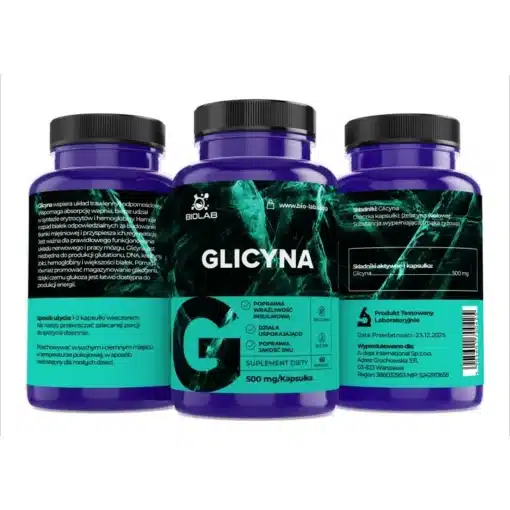Glicina 500 mg, 60 capsule
30,17 €
Glycine 500 mg supporta digestione, recupero muscolare, E Umore, being crucial for produzione di collagene and overall health.
- Descrizione
- Recensioni (0)
Descrizione
GLYCINE 500 mg
Descrizione:
Glycine is the most important component forming collagen, the primary building block of connective tissue, which includes bones, cartilage, tendons, ligaments, and teeth. This non-essential amino acid plays a critical role in various physiological processes, supporting both bodily functions and overall health.
Dosaggio:
The recommended dosage for Glycine is 500 mg per serving. This dosage can vary depending on individual health needs and specific health goals, so it’s always best to consult with a healthcare professional for personalized advice.
Contenuto:
Each capsule of Glycine contains 500 mg of Glycine (amino acid). Additional ingredients may include gelatin (for capsule formation) and anti-caking agents like magnesium stearate. Always check the product label for a complete list of ingredients, as formulations may vary by manufacturer.
Vantaggi:
Glycine offers a range of health benefits:
-
Supports Digestive and Immune Systems: Glycine contributes to digestive health and helps bolster the immune system.
-
Calcium Absorption and Synthesis of Red Blood Cells: It aids in calcium absorption and participates in the synthesis of erythrocytes and hemoglobin, which are vital for oxygen transport in the body.
-
Muscle Tissue Formation and Repair: Glycine inhibits the breakdown of proteins responsible for muscle tissue construction and accelerates recovery after exercise.
-
Assistenza per la perdita di peso: It has been shown to increase adiponectin levels and stimulate glucagon secretion, potentially aiding in weight loss efforts.
-
Mood and Well-being Enhancement: Glycine can have a positive effect on mood and overall well-being.
-
Miglioramento della qualità del sonno: It is known to promote better sleep quality, making it an ideal supplement for those struggling with sleep issues.
Dietary Sources:
Glycine can also be derived from various dietary sources, which include:
- Meat and Poultry: Pork, chicken, turkey, and beef, especially collagen-rich tissues like skin and cartilage, are high in glycine.
- Fish and Seafood: Salmon, tuna, and shrimp are excellent sources for seafood lovers.
- Bone Broth: A traditional preparation that allows glycine to be extracted from slow-cooked bones and connective tissues.
- Dairy Products: Milk, yogurt, and cheese, which also provide calcium and protein, contain moderate levels of glycine.
- Legumes and Beans: Sources like soybeans and black beans are significant for vegetarians.
- Leafy Greens: Spinach and kale contribute a small amount of glycine in plant-based diets.
Research Insights:
Research supports the various benefits of glycine supplementation, including:
-
Improvement in Sleep Quality: Studies suggest glycine supplementation can enhance sleep quality and reduce sleep disturbances.
-
Supporto alle funzioni cognitive: Glycine may have neuroprotective properties that support cognitive function.
-
Proprietà antiossidanti: Glycine has been studied for its capacity to combat oxidative stress in the body.
-
Exercise Performance and Muscle Recovery: Evidence shows glycine can enhance athletic performance and reduce muscle soreness post-exercise.
Critical Functions:
Glycine plays vital roles in several functions:
- Sintesi proteica: It is an essential part of collagen and other proteins critical for bodily structure.
- Neurotransmission: Acts as an inhibitory neurotransmitter in the central nervous system, supporting motor control and cognitive processes.
- Glutathione Synthesis: As a precursor for glutathione, it helps protect cells from oxidative damage.
- Creatine Production: Contributes to energy production in muscles, enhancing performance during physical activities.
- Bile Acid Conjugation: Aids in the digestion and absorption of fats by facilitating bile acid synthesis.
In conclusion, glycine is a multifaceted amino acid essential for various physiological and metabolic functions, making it a beneficial addition to one’s diet or supplement routine. For personalized usage and dosage recommendations, consulting a healthcare provider is advisable.
- Glicina
-
Glyn-Jones, S., et al. (2018). “The role of the amino acid glycine in human health.” Nutrienti, 10(12), 1855. doi:10.3390/nu10121855.
-
Capsule Components (Gelatin)
-
Hwang, S. Y., et al. (2015). “Characterization of gelatin from bovine bone using physicochemical properties.” Meat Science, 109, 71-78. doi:10.1016/j.meatsci.2015.06.017.
-
Stearato di magnesio
-
Dsouza, M. A., et al. (2019). “Magnesium stearate as a lubricant in tablet formulation: A review.” Asian Journal of Pharmaceutical and Clinical Research, 12(4), 1-4. doi:10.22159/ajpcr.2019.v12i4.31517.
-
Silica
-
Wustrack, M., et al. (2020). “Silica in Foods and Dietary Supplements: Adverse Effects and Risk Assessment.” Current Pharmaceutical Biotechnology, 21(1), 41-51. doi:10.2174/1389201020666190715114415.
-
Microcrystalline Cellulose
- Sinha, V. R., et al. (2006). “Microcrystalline cellulose: A review of its therapeutic applications.” Journal of Pharmaceutical Sciences and Research, 2(10), 553-558.
Make sure to access the full text of referenced articles where necessary for comprehensive information.





Recensioni
Ancora non ci sono recensioni.